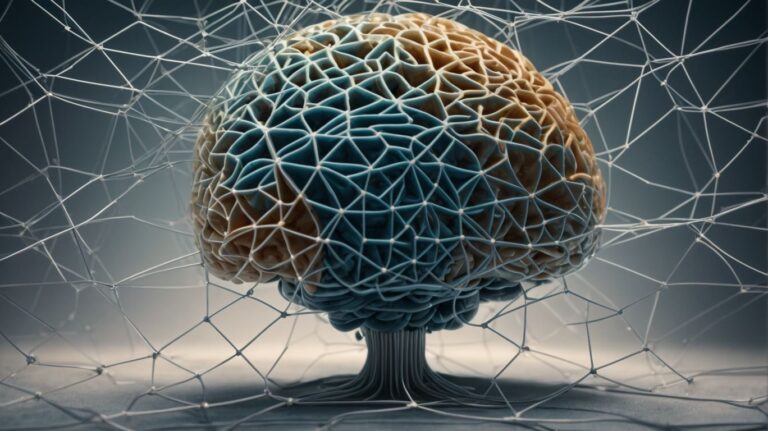Have you ever experienced a profound loss of self or a sense of oneness with the universe? These are just a few of the symptoms of ego death, a fascinating phenomenon that has been studied by psychologists throughout history.
From Carl Jung’s concept of individuation to Stanislav Grof’s work in transpersonal psychology, this article will delve into the theories, causes, signs, and benefits of ego death. We will also explore the challenges and risks associated with this experience, as well as how therapists can help individuals navigate through it.
Contents
- 1 Key Takeaways:
- 2 What Is Ego Death?
- 3 History of Ego Death in Psychology
- 4 Theories on Ego Death
- 5 Causes of Ego Death
- 6 Signs and Symptoms of Ego Death
- 7 Psychological Benefits of Ego Death
- 8 Challenges and Risks of Ego Death
- 9 How to Navigate Ego Death in Therapy
- 10 Frequently Asked Questions
- 10.1 What is ego death and how is it explored in the context of psychology?
- 10.2 What are some common ways individuals experience ego death in the context of psychology?
- 10.3 Can exploring ego death in the context of psychology have therapeutic benefits?
- 10.4 Are there any potential risks or dangers associated with exploring ego death in the context of psychology?
- 10.5 How does exploring ego death fit into the larger field of psychology?
- 10.6 Can anyone experience ego death, or is it only accessible to certain individuals?
Key Takeaways:
What Is Ego Death?
Ego death is a profound psychological and philosophical concept that involves the dissolution or disintegration of one’s sense of self, leading to a transformative experience that transcends ordinary consciousness.
During ego death, individuals often report a feeling of interconnectedness with everything around them, blurring the lines between the self and the external world. This dissolution of the ego can bring about a profound sense of oneness and unity with the universe, challenging fundamental beliefs about personal identity and existence.
Spiritual experiences and psychedelic drugs such as LSD or psilocybin mushrooms are often associated with inducing states of ego death, as they can alter perception and disrupt the normal functioning of the ego. These substances are believed to temporarily dissolve the boundaries of the self, opening up pathways to altered states of consciousness and heightened spiritual awareness.
History of Ego Death in Psychology
The history of ego death in psychology traces back to the pioneering work of notable figures such as the psychoanalyst Carl Jung, who explored concepts of individuation and the collective unconscious, as well as the later influence of psychedelic drugs like LSD on inducing mystical experiences.
Carl Jung’s emphasis on the interconnectedness of the individual with the broader human experience laid the groundwork for understanding the dissolution of the ego. His theories delved into the depths of the human psyche, highlighting the profound impact of the unconscious mind on one’s sense of self.
The introduction of LSD in the mid-20th century sparked new avenues of exploring altered states of consciousness and challenging traditional notions of identity. This powerful psychedelic substance, when used under controlled settings, allowed individuals to transcend their ego boundaries, offering glimpses into a reality beyond the ordinary. For more information on exploring ego death in the context of psychology, click here.
Carl Jung and Individuation
Carl Jung’s concept of individuation, rooted in the exploration of the collective unconscious, delves into the transformative possibilities of ego death as a pathway to profound spiritual experiences and self-realization.
Individuation, according to Jung, is a process of integrating the conscious and unconscious aspects of the psyche to achieve a harmonious and whole sense of self.
This journey involves confronting and embracing the shadow self, those repressed or hidden aspects of personality that need acknowledgment.
By acknowledging and integrating these shadow elements, an individual can move towards greater psychological balance and growth.
Stanislav Grof and Transpersonal Psychology
Stanislav Grof’s contributions to transpersonal psychology shed light on the transformative potential of ego death experiences induced by psychedelic substances, leading individuals towards profound mystical experiences and spiritual insights.
Through his extensive research, Grof explored how the dissolution of the ego under the influence of psychedelic substances could open doors to states of consciousness beyond the ordinary waking mind.
These mystical experiences often involve a profound sense of interconnectedness with the universe, feelings of unity, and a deep understanding of life’s mysteries. Individuals undergoing such experiences frequently report a shift in their perception of reality, leading to psychological breakthroughs and profound spiritual revelations.
Grof’s work highlights the potential for psychedelics to serve as catalysts for personal transformation and spiritual growth.
Theories on Ego Death
Various theories on ego death have been proposed by influential psychologists such as Freud, who explored the structure of the ego, and Maslow, who delved into the concept of self-actualization and its relationship to transformative experiences.
Freud’s theory of the ego, which is a central component of his psychoanalytic framework, elucidates the importance of balancing the demands of the id, superego, and external reality. According to Freud, the ego acts as a mediator, seeking to satisfy the desires of the id in a socially acceptable manner.
On the other hand, Maslow’s concept of self-actualization represents the highest level of psychological development, where individuals strive towards fulfilling their potential and achieving personal growth. These theories, although distinct in their perspectives, converge on the notion that transformative experiences can challenge the ego’s boundaries, leading to moments of ego dissolution.
Through self-discovery and introspection, individuals may confront existential questions and navigate profound shifts in their sense of self.
Freud’s Theory of the Ego
Freud’s theory of the ego provides insights into the intricate workings of the human psyche, exploring the mechanisms of ego dissolution and its psychological implications in the context of transformative experiences.
According to Freud, the ego serves as the mediator between the primal id and the moralistic superego, managing conflicting desires and societal norms.
Ego dissolution, as Freud posited, occurs when the ego loses its ability to maintain this delicate balance, leading to a transient state of altered consciousness.
Psychologically, this dissolution of the ego can pave the way for profound introspection and self-discovery, sometimes referred to as ego death.
This transformative experience often involves a sense of profound unity with the universe, dissolution of boundaries between self and other, and a shift in perspective towards interconnectedness.
Maslow’s Theory of Self-Actualization
Maslow’s theory of self-actualization explores the journey towards personal growth and fulfillment, shedding light on how ego death experiences can catalyze profound transformations in individuals seeking higher levels of consciousness.
At the core of Maslow’s theory is the idea that individuals have a hierarchy of needs that drive their behavior. This hierarchy is based on the belief that self-actualization represents the pinnacle of human potential. Self-actualization involves realizing one’s full capacities, talents, and potential, leading to a deep sense of satisfaction and meaning in life.
According to Maslow, individuals must first satisfy lower-level needs like physiological needs, safety, love, and esteem before they can strive for self-actualization. This means that individuals must have their basic needs met before they can focus on personal growth and fulfillment. However, the journey towards self-actualization is not always a straight path. It can involve setbacks and challenges that require introspection and growth.
Causes of Ego Death
Ego death can arise from diverse causes, ranging from profound trauma or existential crisis to intentional spiritual practices and transformative psychedelic experiences that challenge one’s sense of self and reality.
Trauma, as a major catalyst for ego dissolution, can stem from childhood experiences, loss, abuse, or significant life events, leading an individual to confront their deepest wounds and eventually dissolve the barriers of their ego, exposing vulnerabilities and hidden truths.
In contrast, engaging in spiritual practices such as meditation, mindfulness, and contemplative rituals can foster a deliberate disintegration of the ego, inviting individuals to transcend their personal identities and connect with a higher consciousness or divine presence, reshaping their understanding of self and existence.
Psychedelic experiences induced by substances like psychedelics can trigger profound alterations in perception and consciousness, dissolving the ego’s boundaries and prompting individuals to explore interconnectedness, unity, and expanded states of awareness that defy conventional reality and usual patterns of thought.
Trauma or Crisis
Traumatic events or existential crises can serve as catalysts for ego death, triggering profound psychological transformations that challenge one’s existing beliefs and perceptions of self and reality.
When individuals undergo intense trauma, such as the sudden loss of a loved one, a near-death experience, or a severe illness, they may experience a dissolution of their ego boundaries.
This dissolution can lead to a complete breakdown of their sense of self, often resulting in a deep introspective journey toward self-discovery and reconstruction.
The psychological impact of such events goes beyond mere emotional distress; it can fundamentally alter the way individuals perceive the world and themselves, opening doors to new perspectives and insights.
Spiritual Practices or Psychedelic Experiences
Engaging in intensive spiritual practices or embarking on psychedelic journeys can lead individuals towards ego death experiences, fostering shifts in consciousness and profound transformations that transcend ordinary reality.
Through these modalities, individuals are pushed beyond the constraints of their ego, allowing them to experience a dissolution of the self and a profound sense of interconnectedness with the universe.
The journey towards ego death often involves a radical reshaping of one’s perception of reality, leading to a profound shift in priorities and values. These experiences are not merely transient moments but can have lasting effects on an individual’s psyche, catalyzing a journey of transformation that extends far beyond the initial encounter with ego death.
Signs and Symptoms of Ego Death
Recognizing ego death entails observing key signs such as dissociation, loss of the sense of self, and a profound sense of oneness with the universe, indicating a shift in perception and identity.
When experiencing dissociation, individuals may feel detached from their physical surroundings, as if observing themselves from a distance. This detachment can cause a profound disconnection from familiar emotions and thoughts, leading to a sense of fragmentation within oneself.
The loss of the sense of self in ego death can be marked by a feeling of losing boundaries between oneself and the external world, blurring the lines that define one’s identity. The profound sense of oneness that accompanies ego death goes beyond mere intellectual understanding; it is a visceral awareness of being interconnected with all existence. This profound state can bring about a deep sense of peace and unity, transcending the limitations of the individual self.
Dissociation
Dissociation, a common hallmark of ego death, involves a profound disconnection from one’s usual sense of self and reality, often leading to transformative shifts in consciousness and personal transformation.
When an individual experiences dissociation, they may feel detached from their physical surroundings, emotions, or memories, creating a sense of unreality. This altered state can be unsettling but also serves as a gateway to exploring deeper aspects of the self and the nature of existence.
Consciousness, in the context of dissociation, undergoes a dynamic reorganization, allowing the individual to view themselves and the world from new perspectives. This reorganization can trigger profound insights, spiritual growth, and an enhanced awareness of interconnectedness.
Through the process of dissociation, one’s conventional identity can dissolve, making space for a more authentic, integrated sense of self to emerge. This metamorphosis of personal identity is a crucial component of the transformative journey that accompanies ego death.
Loss of Sense of Self
The loss of the sense of self during ego death experiences often accompanies a profound identity crisis, catalyzing moments of spiritual awakening and self-realization that challenge one’s fundamental perceptions of who they are.
Within the realm of spiritual growth, the concept of ego death emerges as a pivotal point where the ego’s constructs dissolve, opening the door to profound self-discovery.
This process unveils layers of conditioned beliefs and societal expectations, allowing individuals to transcend the limitations of their narrow self-concept.
As individuals navigate through the void left by the shattering of their ego, they confront the depths of their being and encounter a raw authenticity that transcends conventional notions of identity.
This transformative journey often ushers in a period of intense introspection and realignment with one’s true essence, fostering a deep sense of interconnectedness with the universe.
Sense of Oneness
Experiencing a profound sense of oneness or unity with the cosmos is a common outcome of ego death, reflecting a deep shift in consciousness that transcends individual identity and perceives interconnectedness with all existence.
This shift towards a state of oneness allows individuals to perceive themselves not as separate entities but as interconnected parts of a vast cosmic web.
It brings about a heightened awareness of the interdependence of all beings and phenomena, fostering a sense of unity that extends beyond the boundaries of the self.
Psychological Benefits of Ego Death
Ego death can yield psychological benefits such as heightened self-awareness, reduced anxiety and depression, and improved interpersonal relationships, offering individuals a path towards inner peace and emotional clarity.
By shedding the layers of ego, individuals may gain a profound understanding of their true selves, transcending societal expectations and personal limitations. This heightened self-awareness allows for a deeper connection with one’s emotions, fostering greater empathy and emotional intelligence.
In the realm of interpersonal relationships, the dissolution of ego can pave the way for more authentic and harmonious connections. When one lets go of ego-driven insecurities and defenses, communication becomes more open and sincere, leading to improved conflict resolution and a stronger sense of intimacy.
Increased Self-Awareness
Ego death fosters increased self-awareness by dismantling limiting beliefs and attachments, paving the way for personal growth, enlightenment, and a deeper understanding of one’s existence in the world.
The process of ego death involves an individual transcending the ego’s constraints and reaching a state of pure awareness and interconnectedness.
Through this profound experience, one can shed the layers of societal conditioning and false identities to reveal their true essence.
This shedding of illusions allows for a reevaluation of priorities and a shift towards aligning actions with authentic intentions and values.
Consequently, individuals undergoing ego death often experience a sense of liberation from the constraints of the ego, leading to a heightened sense of clarity and purpose in life.
Reduction of Anxiety and Depression
Ego death experiences have shown promise in alleviating anxiety and depression, fostering improved mental well-being and clarity by addressing deep-seated emotional issues and promoting inner peace.
Ego dissolution, a key aspect of ego death experiences, involves the temporary loss of the sense of self and separation from the ego, leading to a profound shift in consciousness.
This altered state of consciousness often allows individuals to transcend their usual thought patterns and self-limiting beliefs, offering a fresh perspective on life and a greater sense of interconnectedness with the world around them.
Through this dissolution of the ego, individuals may experience a sense of oneness with everything, which can help reduce feelings of isolation and existential angst that often contribute to anxiety and depression.
By letting go of the need to control and protect the ego, individuals can open themselves up to a deeper understanding of their emotions and experiences.
Improved Relationships
Ego death can lead to improved relationships by fostering deeper connections, enhanced emotional awareness, and mutual understanding, offering individuals a pathway to personal growth and enriched social interactions.
When individuals experience ego death, they often undergo a profound shift in perspective that allows them to see beyond their own self-interests and egocentric behaviors.
This newfound awareness of interconnectedness and empathy can transform the way they relate to others, leading to more authentic and meaningful connections.
Connection takes on a deeper significance as individuals become more attuned to their emotions and those of others, fostering a sense of emotional intimacy that strengthens bonds.
Challenges and Risks of Ego Death
Navigating ego death presents challenges such as fear, resistance to change, difficulties in integrating the experience, and the potential risk of psychological crises like psychosis, highlighting the complexities of profound transformation.
One of the key obstacles individuals encounter when facing ego death is the intense fear that arises from losing a sense of self and identity.
This fear can lead to a strong resistance towards the process of letting go and accepting the dissolution of the ego.
In addition, integrating the profound experience of ego death into one’s daily life poses significant difficulties as it requires a fundamental shift in one’s perception of reality and self-concept.
Fear and Resistance
Fear and resistance are common responses to ego death experiences, stemming from the psychological discomfort of confronting profound transformations and the dissolution of familiar identity constructs.
When individuals encounter ego death, they often face an intense internal battle between the desire for growth and the fear of the unknown.
This internal conflict can give rise to a range of emotional responses, from anxiety and panic to resistance and avoidance. The ego, being the central core of one’s self-identity, resists dissolution as it perceives the transformation as a threat to its existence. This struggle between holding onto the familiar and embracing the new can lead to a state of inner turmoil and existential questioning.
Difficulty Integrating the Experience
Integrating ego death experiences can be challenging, as individuals grapple with the profound shifts in perception, identity, and consciousness that occur during transformative moments, highlighting the importance of processing and internalizing such encounters.
During these experiences, individuals often face a dismantling of their previously held beliefs and constructs, leading to a sense of disorientation and vulnerability.
The journey towards integration involves navigating these feelings, embracing the uncertainty, and delving deep into the core of one’s being to make sense of the new realities that emerge.
Personal growth becomes intertwined with these moments of introspection, as individuals confront their fears, insecurities, and desires in the quest for self-discovery and understanding.
Potential for Psychosis
Ego death experiences carry the potential risk of triggering psychological crises like psychosis, where individuals may struggle with maintaining mental well-being and reality orientation amidst profound transformative processes, necessitating careful support and guidance.
Psychosis, as a potential consequence of ego death experiences, can manifest as a detachment from reality, causing individuals to grapple with distorted perceptions and beliefs that challenge their sense of self and the world around them.
These episodes of psychosis can be deeply distressing and disorienting, leading to heightened anxiety, confusion, and a sense of loss of control.
During such turbulent times, the individual’s mental well-being is at great risk, requiring a delicate balance of professional intervention, therapy, and a supportive environment to aid in the process of regaining psychological stability and reality orientation.
Navigating ego death in therapy entails providing supportive environments for individuals to process their experiences, integrate transformative insights, and address underlying issues that emerge during profound psychological shifts.
Creating a safe and non-judgmental space is crucial for clients to explore their ego death experiences without fear of rejection or invalidation.
Therapists can help clients navigate the dissolution of their sense of self by guiding them towards inner exploration and self-reflection. Facilitating integration of insights gained during ego death is a delicate process that involves helping clients make sense of their experiences and incorporate newfound understandings into their daily lives.
Frequently Asked Questions
What is ego death and how is it explored in the context of psychology?
Ego death is a term used to describe a temporary experience of detachment from one’s sense of self and identity. In the context of psychology, it is often explored as a potential tool for self-discovery and personal growth.
What are some common ways individuals experience ego death in the context of psychology?
Ego death can be triggered by various practices such as meditation, psychedelic substances, intense therapy sessions, or near-death experiences. Each person may have a unique experience, but the common thread is a temporary dissolution of the ego.
Can exploring ego death in the context of psychology have therapeutic benefits?
Yes, many individuals report a sense of increased self-awareness, improved mental health, and a deeper understanding of their thoughts and emotions after experiencing ego death. It can also help individuals let go of limiting beliefs and negative patterns.
Are there any potential risks or dangers associated with exploring ego death in the context of psychology?
While ego death can be a transformative experience, it is important to approach it with caution and under the guidance of a trained professional. There may be risks of increased anxiety or distress, and individuals with underlying mental health conditions should take extra precautions.
How does exploring ego death fit into the larger field of psychology?
Ego death is a relatively new concept in psychology, and it falls under the umbrella of transpersonal psychology, which focuses on the spiritual and transcendent aspects of human experience. It also overlaps with areas such as mindfulness, altered states of consciousness, and self-actualization.
Can anyone experience ego death, or is it only accessible to certain individuals?
While ego death can occur spontaneously, it is more likely to be triggered by intentional practices such as meditation or psychedelic use. However, not everyone may have the same level of sensitivity or receptiveness to these experiences.




